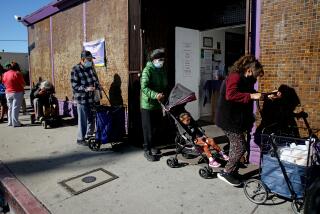L.A. County to spend up to $100 million a year for affordable housing
- Share via
To address growing homelessness in the region, Los Angeles County supervisors voted unanimously Tuesday to gradually set aside up to $100 million a year to construct, maintain and subsidize affordable housing.
The move was hailed by business leaders, anti-poverty advocates and nonprofit housing developers, but drew concerns from some about the size of the price tag and whether the county can afford it.
Supervisors Sheila Kuehl and Mark Ridley-Thomas proposed creation of the housing fund, which will start with $20 million next year. The county’s annual contribution will grow over the next five years until it reaches $100 million. The source of the funding has yet to be determined. The supervisors asked the county’s chief executive to return with a plan as part of next year’s budget process.
Supervisor Don Knabe initially objected, saying the county faces uncertainties and other potentially big-ticket spending requirements over the next five years, including federal requirements for reform in the county jails.
Rather than setting aside a set dollar figure, Knabe proposed that the county tap 20% of the money left over at the end of each budget year, which he estimated would come out to $28 million a year, for the next five years. After that, the county would set aside 20% of property tax revenues that would have gone to redevelopment agencies before the state dissolved them in 2012. Prior to that time, 20% of redevelopment revenues were required to go to affordable housing.
The supervisors agreed to have the county’s chief executive take a close look at Knabe’s funding formula as a means of paying for the program.
Kuehl said the affordable housing money is one piece of a larger plan to address poverty and homelessness.
“This is not the be-all and end-all of our approach to housing and homelessness.” The action, she said, is “a way of trying to build for a future where people will be able to afford their housing and therefore will not lose it and become homeless.”
County and city officials have showed a heightened interest in homelessness since this year’s countywide count by the Los Angeles Homeless Services Authority showed a 12% jump over the last two years in the number of people living on the streets of the city and county of Los Angeles. The count in January found more than 44,000 homeless. The county and city have each said they will put $100 million toward solutions for homelessness this year, and are working on parallel plans to address the issue, both expected to be adopted early next year.
Knabe, who eventually voted along with the other supervisors in favor of the housing fund, initially expressed irritation at “taking just numbers out of the sky” without knowing how the program would be paid for. He said his approach would ensure the county will continue to have money to support the housing programs. “The most important piece of all this is sustainability,” he said.
His colleagues said they were confident that the county would find ways to pay for the program and emphasized the urgency of the county’s affordable housing shortage.
“The objective is to get moving and moving now on building more affordable housing, and the formula, the methodology can and will be worked out,” said Ridley-Thomas. “We are not moving fast enough keeping up with the crisis that has enveloped us.”
Sofya Preger, a formerly homeless county resident now living in supportive housing, told the supervisors: “People are spending 90% of their income just to stay housed. Something like a car accident will put them into homelessness.”
Increasing the amount of affordable housing available will help keep those people in housing, she said.
Jerry Neuman, co-chair of Home for Good, a joint project of United Way of Greater Los Angeles and the Los Angeles Area Chamber of Commerce to address homelessness, said in the long run, housing people will save the county money on law enforcement and services.
“This is more than a moral imperative. It is an economic one,” he said.
The majority of the money would go to building and maintaining affordable housing, but some could go to rental subsidies and programs to help families find housing. The board asked a group of county administrators responsible for housing, health, law enforcement, child welfare, social services and land use planning to analyze the county’s gaps in affordable housing and where the money would best be spent.
The officials are expected to come back in about five months with detailed plans for creating the fund, identifying where the money would come from, and creating an outline for an annual report on affordable housing.
abby.sewell@latimes.com
Twitter: @sewella
More to Read
Sign up for Essential California
The most important California stories and recommendations in your inbox every morning.
You may occasionally receive promotional content from the Los Angeles Times.














